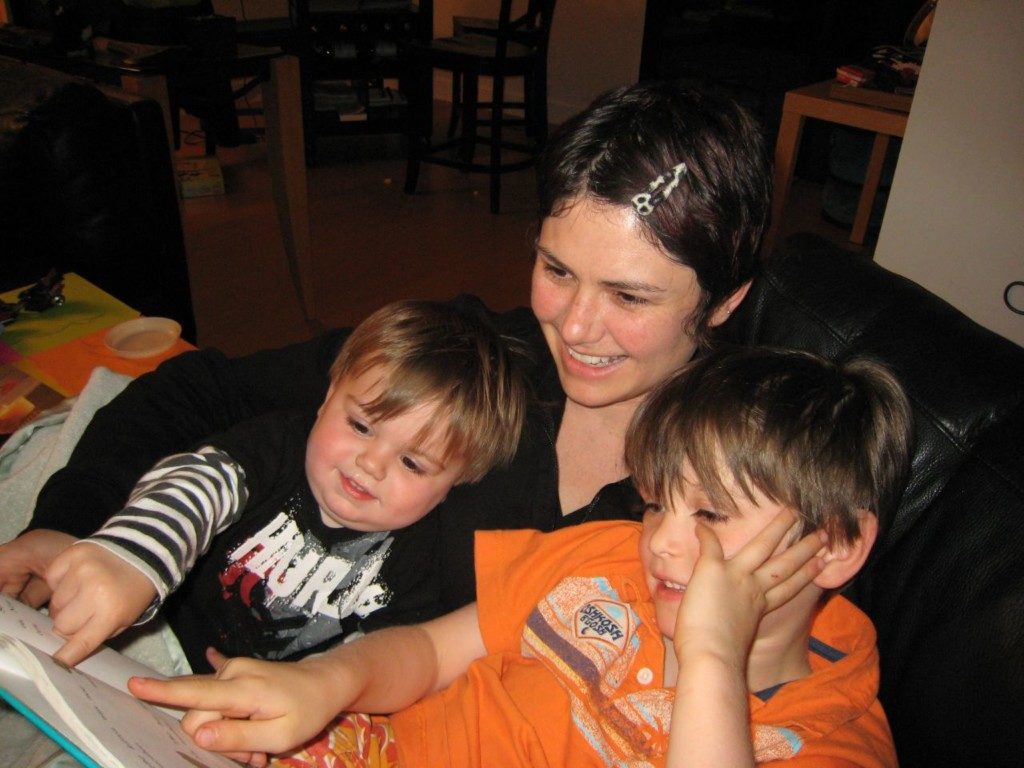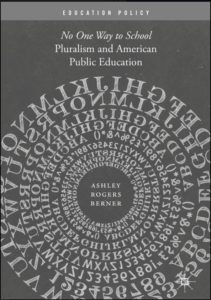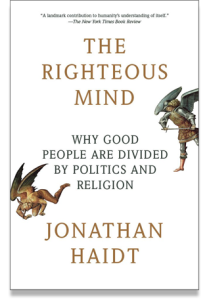
Two new books lend intellectual heft to the idea that families are the primary educators of children. Photo via Neeta Lind.
I finished a couple of books that bear upon the fate of the ordinary family in its hope to maintain authority over its own affairs, and specifically the governance of its children.
Herewith, a brief report.
Professor Melissa Moschella’s book asks the right question: To Whom Do Children Belong? Parental Rights, Civic Education and Children’s Autonomy. (Cambridge U. Press) The author is a philosopher in the natural law tradition. I have read some of her previous work and can, with great confidence report that she is a master of the Aristotelian-Thomistic approach to ethics, private and public.
Her book proceeds from a lesson or two in the method, gradually to a description of the problem and on to the solution. If nature is the method, the problem is the corruption of what is nature by society’s and government’s collision against the authority of the parent, and (most flagrantly that) the ordinary and low-income family. The primary scene of the crime is conscription of the child for the school called “public” and for a message that is predictable only in its exclusion of anything transcendental. Its effect on the child, the parent and society in quite predictable. The experience of responsibility is left to both parent and child, all to injury of a society drifting toward sheer confusion in our common life and in what is supposed to be home sweet home. (more…)
 Public education exists, in part, to promote healthy human development. Therefore, our efforts to improve public education should be informed by the science of human behavior. Public education is most effective when its processes and systems are aligned with our best understandings of cognition, emotions, motivation, and learning.
Public education exists, in part, to promote healthy human development. Therefore, our efforts to improve public education should be informed by the science of human behavior. Public education is most effective when its processes and systems are aligned with our best understandings of cognition, emotions, motivation, and learning.
Hence, my enthusiasm for Mary Helen Immordino-Yang’s 2016 book, Emotions, Learning, and the Brain: Exploring the Educational Implications of Affective Neuroscience.
Immordino-Yang is a neuroscientist and former public-school teacher who uses brain mapping technology to better understand how our brains work. Her focus in this book is the relationship between emotions, cognition, and learning. Her key finding is that emotions and cognition are inseparable and interdependent. They are two sides of the same coin. Emotions motivate cognition, cognition impacts emotions, and learning is controlled by this symbiosis.
Learning is hard work. It requires purposeful information processing, including attending to information, applying information, evaluating information, and filing information in memory. This level of cognitive effort requires motivation and motivation derives from emotion (and cognition).
As Immordino-Yang writes:
It is literally neurobiologically impossible to build memories, engage complex thoughts, or make meaningful decisions without emotion … we only think about things we care about … without emotion, all decisions and outcomes are equal—people can have no preferences, no interests, no motivation, no morality, and no sense of creativity, beauty, or purpose … emotions are, in essence, the rudder that steers thinking. (more…)
 When it comes to public education, the U.S. stands apart from many industrialized democracies. It excludes private and faith-based schools, and has generally relied on local governments as the sole providers of publicly supported education in a geographic area.
When it comes to public education, the U.S. stands apart from many industrialized democracies. It excludes private and faith-based schools, and has generally relied on local governments as the sole providers of publicly supported education in a geographic area.
A new volume by Johns Hopkins University researcher Ashley Berner argues this arrangement is largely an accident of history. She points to a new definition of public education, which is publicly funded and publicly accountable — and encompasses private schools.
As she writes in her final chapter:
No One Way to School attempts to draw a more inclusive argument that rests upon the foundational goals of the common school, while affirming that they are better met by plural education, than by uniformity. Excellence, equity, opportunity, and citizenship resonate across America’s educational history.
She contemplates a three-sector approach to public education that fits alongside The Urban School System of the Future, the policy platform of the Black Alliance for Educational Options, and precious few others in today's education debate.
Her ideas echo many of the themes we’ve tried to emphasize for more than six years on this blog. And they’re likely to stretch the thinking of people in just about every corner of the school choice movement.
She draws vital lessons from John Chubb and Terry Moe about the ways bureaucracy can vitiate academic excellence, but she abjures the hands-off regulatory approach they advocate as one of several “narratives that risk being counter-productive.” (more…)
The public education system that was born during the industrial revolution of the nineteenth century is slowly, painfully being transformed. New technologies and better understandings of how cognition and emotions impact learning are encouraging increasing numbers of elected officials, parents and educators to advocate replacing standardized, one-size-fits-all schooling with empowered teachers and students working in customized learning environments.
 Predictably, these changes are generating strong political resistance from school boards, teacher unions, PTAs and others with long-standing ties to the status quo. This political struggle is playing out in numerous venues, including neighborhood associations, school boards, state legislatures, the courts and Congress.
Predictably, these changes are generating strong political resistance from school boards, teacher unions, PTAs and others with long-standing ties to the status quo. This political struggle is playing out in numerous venues, including neighborhood associations, school boards, state legislatures, the courts and Congress.
Thomas Kuhn’s 1962 classic, The Structure of Scientific Revolutions, is required reading for anyone wanting to better understand this conflict. Kuhn’s descriptions of how various scientific fields have progressed historically illustrates the psychology and sociology at play when communities are challenged to reconsider their most basic beliefs and understandings. His work explains why individuals and communities resist change, and why this resistance, while often frustrating and counterproductive, can also help ensure any changes are genuine improvements.
Kuhn argued that scientific progress occurs in the context of a comprehensive set of assumptions he called a paradigm. The word has been abused and misapplied in the decades since Kuhn published his book, but he saw a paradigm as a worldview that operates as the lens through which a scientific community perceives and understands its field. (more…)
 William O. Douglas joined the US Supreme Court in 1939 and served until 1975. Soon after joining the Court, the then Chief Justice, Charles Evans Hughes, told Douglas that almost all judicial decisions on the high court are emotional decisions. That is, Supreme Court justices come to a fairly quick emotional decision about a case and then spend time seeking out legal reasoning to justify that decision.
William O. Douglas joined the US Supreme Court in 1939 and served until 1975. Soon after joining the Court, the then Chief Justice, Charles Evans Hughes, told Douglas that almost all judicial decisions on the high court are emotional decisions. That is, Supreme Court justices come to a fairly quick emotional decision about a case and then spend time seeking out legal reasoning to justify that decision.
Douglas was initially skeptical this was true, but after several years on the Court he concluded that Chief Justice Hughes was correct. The overwhelming majority of Supreme Court decisions started as emotional decisions.
While some might want to imagine decisions at the heart of our justice system are purely the result of cold, rational legal analysis, there is nothing unusual in how Supreme Court justices arrive at their decisions. They’re just being human. We now have several decades of psychological research showing that most of our decisions start as emotional decisions and that we use reasoning after the fact to justify these decisions.
This psychological truism, that most decision-making is emotionally driven, has great relevance for us in the educational choice movement. We are engaged in an intense political and public relations struggle and we need to better understand the psychology of judgement, decision-making and persuasion if we are to prevail. Hence, my recommendation that all education choice advocates read The Righteous Mind: Why Good People Are Divided by Politics and Religion. (more…)
Education policy debates are awash in books. Memoirs, polemics, volumes of policy wonkery — some of which we highlight on this blog.
 In the coming months, we're going to devote more space to the ones we feel are required reading, or at least come close.
In the coming months, we're going to devote more space to the ones we feel are required reading, or at least come close.
We hope to look beyond the obvious. We're interested in books that may have been published decades before their time, and that, when dusted off, contain ideas that are finally ripe. We're interested in books from fields like psychology, philosophy, and political science that aren't explicitly about education, but contain vital insights for people who work in schools or advocate for education policies. We're also interested in volumes already considered essential, if, for some reason, recent events have underscored their relevance or cast them in a new light. (more…)